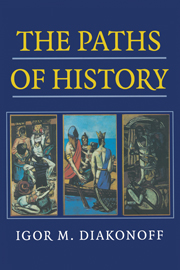Book contents
- Frontmatter
- Contents
- Foreword by Geoffrey Hoskins
- Preface
- Introduction
- 1 First Phase (Primitive)
- 2 Second Phase (Primitive Communal)
- 3 Third Phase (Early Antiquity)
- 4 Fourth Phase (Imperial Antiquity)
- 5 Fifth Phase (the Middle Ages)
- 6 Sixth Phase (the Stable Absolutist Post-Medieval Phase)
- 7 Seventh Phase (Capitalist)
- 8 Eighth Phase (Post-Capitalist)
- Index
Foreword by Geoffrey Hoskins
Published online by Cambridge University Press: 02 December 2009
- Frontmatter
- Contents
- Foreword by Geoffrey Hoskins
- Preface
- Introduction
- 1 First Phase (Primitive)
- 2 Second Phase (Primitive Communal)
- 3 Third Phase (Early Antiquity)
- 4 Fourth Phase (Imperial Antiquity)
- 5 Fifth Phase (the Middle Ages)
- 6 Sixth Phase (the Stable Absolutist Post-Medieval Phase)
- 7 Seventh Phase (Capitalist)
- 8 Eighth Phase (Post-Capitalist)
- Index
Summary
The collapse of the Soviet Union and the ending of the Marxist monopoly on intellectual life freed Russian social scientists and historians to deploy a broader range of theoretical approaches to the history of their own country and the world. When one couples this renewed freedom with the very distinctive personal experience of those who have lived through the Soviet experiment, the results are sometimes remarkable. The Paths of History is one of the most intriguing and innovative fruits of this intellectual and spiritual milieu.
Its author, Igor Mikhailovich Diakonoff, was born on 12 January 1915 in Petrograd, the son of a bank employee. His father had enough experience of finance and banking to be sent as an employee to the Commercial Department of the Soviet embassy in Christiana (Oslo). Thus Igor received his primary education at a Norwegian school, and learned to speak Norwegian fluently, the first of the many languages which he displayed a remarkable ability and desire to learn in later life. (At the age of seventy-three he confessed to a colleague who was learning modern Greek: ‘I'm always jealous of someone who knows a language I don't!') His highly unusual linguistic range has enabled him to penetrate the mentality of many different cultures, and this undoubtedly underlies the wide sweep of human sympathy evident in The Paths of History. One of his acquisitions was English, which he knows so well that he has translated some of the works of Keats and Tennyson, and was able to prepare this translation of The Paths of History largely himself.
- Type
- Chapter
- Information
- The Paths of History , pp. vii - xPublisher: Cambridge University PressPrint publication year: 1999

